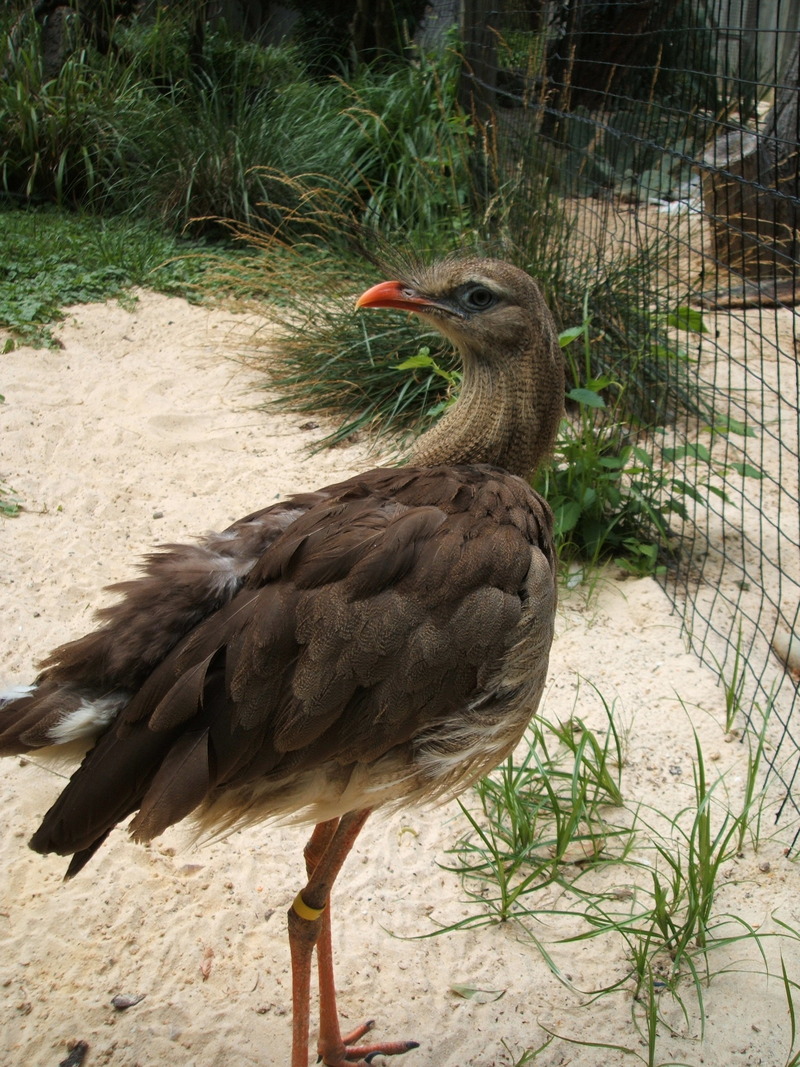Red-legged Seriema
From Wikipedia, the free encyclopedia
[Photo] Cariama cristata at the Smithsonian National Zoological Park in Washington, DC. Date July 3, 2007. Author Steven G. Johnson (http://commons.wikimedia.org/wiki/User:Stevenj) Copyright (C) 2007 Steven G. Johnson
Permission is granted to copy, distribute and/or modify this document under the terms of the GNU Free Documentation License, Version 1.2 or any later version published by the Free Software Foundation; with no Invariant Sections, no Front-Cover Texts, and no Back-Cover Texts. A copy of the license is included in the section entitled "GNU Free Documentation License". |
The Red-legged Seriema or Crested Cariama (Cariama cristata) is a terrestrial, mostly predatory bird in the seriema family.
It is 75 to 90 cm (30 to 36 in) long, with a fairly long neck, tail, and legs. The plumage is medium brown above with black markings; pale brown on the head, neck, and breast; and white on the belly. The tail has a black band near the tip and a white tip. The beak and legs are red, and the eyes are yellow. Soft feathers emerge from the base of the bill to form a fan-shaped crest (Holyoak and Heinsohn 2003).
The Red-legged Seriema inhabits grasslands from Brazil south of the Amazon to Uruguay and northern Argentina. This range is estimated at 5.9 million km² (BirdLife International 2004).
It is usually seen singly or in pairs, but sometimes in groups up to four, apparently families. It typically walks on the ground and can easily run faster than a human in its habitat. It will flee a car on foot at speeds up to 25 km/h (15 mi/hr) before flying (Redford and Peters 1986).
The song has a quality described as "a cross between 'the serrated bark of a young dog and the clucking of turkeys'" (H. Burmeister, quoted and translated by Redford and Peters 1986). It consists of three sections:
Repeated single notes at constant pitch (1200 to 1300 kHz) and duration but increasing tempo
Repeated two- or three-note subphrases of slightly higher pitch with increasing tempo
Subphrases of up to 10 notes, shorter ones rising in pitch and longer ones falling, two-subphrase cominations increasing in number of notes and tempo and then decreasing in tempo.
At the loudest part of the song, the bird has its neck bent so its head is touching its back. Both members of a pair as well as young down to the age of two weeks sing; often one member of a family starts a song just as another finishes, or two sing simultaneously. The song can be heard several kilometres away; in Emas National Park, Brazil, in 1981???1982, observers often heard four Red-legged Seriemas or groups singing at once (Redford and Peters 1986).
In one conflict between two birds, they jumped at each other feet-first, keeping their balance by flapping (Redford and Peters 1986).
This species nests on the ground (Holyoak and Heinsohn 2003) or in a bush or tree up to 3 m above the ground. In the latter case adults jump into the nest rather than fly (Redford and Peters 1986).
Many other characteristics are shared with the Black-legged Seriema, the only other member of its family. Some are covered under Cariamidae.
http://en.wikipedia.org/wiki/Red-legged_Seriema
| The text in this page is based on the copyrighted Wikipedia article shown in above URL. It is used under the GNU Free Documentation License. You may redistribute it, verbatim or modified, providing that you comply with the terms of the GFDL. |
|

